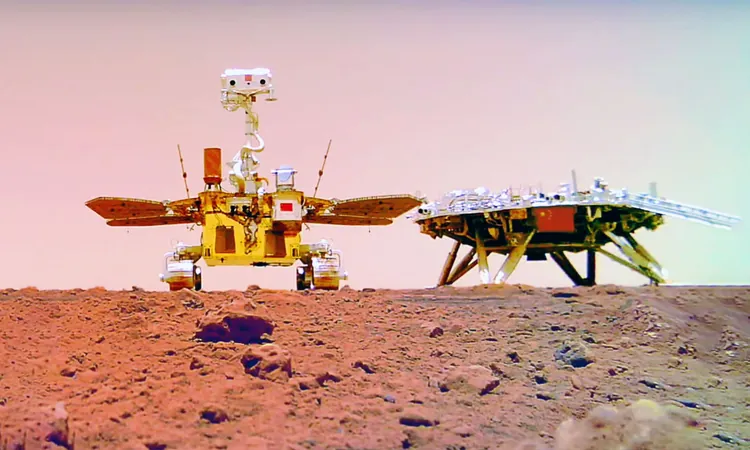
Chinese Mars Rover Zhurong Discovers Evidence of Ancient Ocean Shoreline on Mars
2024-11-25
Author: Ting
Chinese Mars Rover Zhurong Discovers Evidence of Ancient Ocean Shoreline on Mars
The Zhurong rover, China's pioneering exploration vehicle on Mars, has stirred up excitement in the scientific community by uncovering compelling evidence of what appears to be a shoreline from an ancient ocean, suggesting that water once filled a vast expanse of Mars' northern lowlands.
Landing in May 2021 in southern Utopia Planitia, the now inactive Zhurong rover embarked on a mission to unveil the mysteries of the Martian surface. Researchers led by Bo Wu from Hong Kong Polytechnic University believe that their findings could alter our understanding of water's history on Mars—an incredibly significant aspect considering the planet’s potential habitability.
What is the Zhurong Mars Rover?
Zhurong, weighing approximately 240 kilograms (around 530 lbs) and roughly the size of a compact car, is equipped with a suite of advanced scientific instruments. Its arsenal includes navigation and topography cameras, a multispectral camera designed for analyzing surface materials, and ground-penetrating radar that can delve up to 100 meters below the Martian surface. This unique combination of tools permits the rover to capture detailed images, investigate geological formations, and study the composition of the Martian soil.
Unraveling Water-Related Features on Mars
For years, scientists have speculated about the existence of vast oceans on Mars, particularly during a period known as the Hesperian epoch, roughly 3.7 billion years ago. Despite the theories, solid proof has been elusive—until now. Utilizing the Zhurong rover's imaging tools, radar, and data from orbiting satellites, Wu and his team have identified water-related formations, including crater-like cones, sedimentary channels, and mud volcanoes, which resemble features found on Earth's coastlines.
According to the researchers, the characteristics observed are indicative of a nearshore environment, perhaps revealing a former coastline of a massive body of water that may have existed on the Red Planet.
Dating the Martian Ocean
The geological analysis suggests that this ocean may have persisted around 3.68 billion years ago. One of the co-authors, Sergey Krasilnikov, noted that the water was likely rich in sediment, creating distinct layering similar to what we observe in ancient oceanic seabeds on Earth. Intriguingly, after the ocean formed, it may have experienced a brief freezing period, lasting between 10,000 to 100,000 years, during which these coastlines were etched into the surface. Eventually, the ocean would dry up around 260 million years later, leaving behind tantalizing evidence of its existence.
Debate in the Scientific Community
Skepticism remains among some experts, including Benjamin Cardenas from Pennsylvania State University, who argues that wind and erosion over millennia would obliterate such fragile features. While Wu acknowledges this valid point, he posits that asteroid impacts may have resurfaced some sections of the shoreline, offering new perspectives on these geological formations.
What Are the Implications for Life on Mars?
The discovery of an ancient ocean leads to groundbreaking questions about the potential for life on Mars. Water is vital for life as we know it, and if this cosmic neighbor once harbored oceans, could it have also supported microbial or even complex life forms? As researchers ponder these queries, NASA's InSight lander discovered significant amounts of water seeping into Mars' crust, suggesting areas that might have supported life.
What’s Next for Zhurong and Future Mars Missions?
The quest does not end here. To confirm these findings and obtain samples for thorough study, Martian samples must be returned to Earth—an endeavor China plans to undertake with its Tianwen 3 sample return mission targeted for 2031, potentially ahead of NASA's own sample return initiatives.
As the Zhurong continues its mission, scientists eagerly await the insights it will provide, offering a glimpse into Mars' watery history. Could Mars have once been brimming with life billions of years ago? That question lingers, with the future of Martian exploration promising to unlock answers that could reshape our understanding of life beyond Earth.
The full study detailing these fascinating findings has been published in the journal Scientific Reports.



 Brasil (PT)
Brasil (PT)
 Canada (EN)
Canada (EN)
 Chile (ES)
Chile (ES)
 España (ES)
España (ES)
 France (FR)
France (FR)
 Hong Kong (EN)
Hong Kong (EN)
 Italia (IT)
Italia (IT)
 日本 (JA)
日本 (JA)
 Magyarország (HU)
Magyarország (HU)
 Norge (NO)
Norge (NO)
 Polska (PL)
Polska (PL)
 Schweiz (DE)
Schweiz (DE)
 Singapore (EN)
Singapore (EN)
 Sverige (SV)
Sverige (SV)
 Suomi (FI)
Suomi (FI)
 Türkiye (TR)
Türkiye (TR)